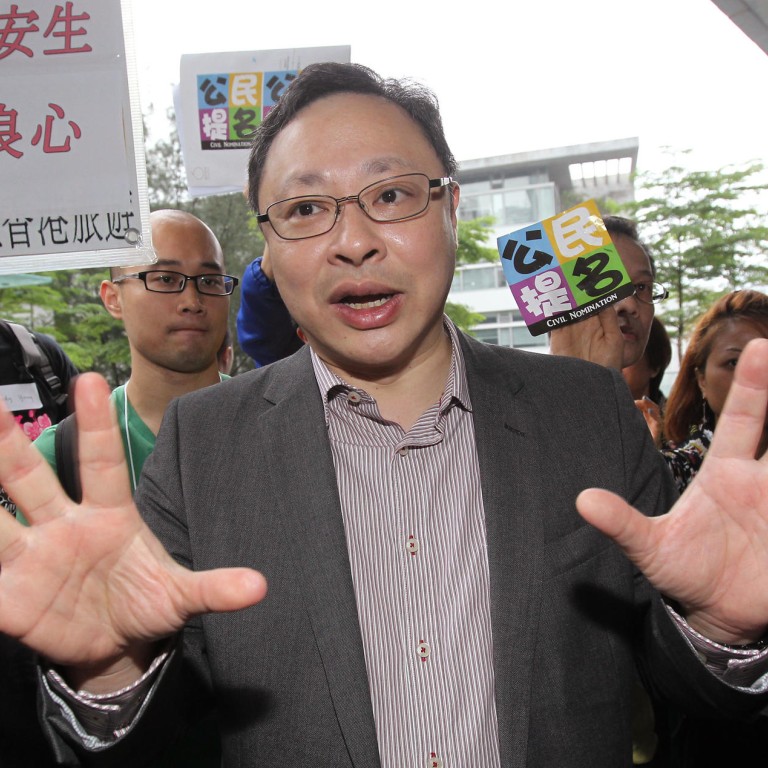
Battle for the soul of Occupy after vote on reform plans
Moderate voters remain campaign's driving force, says Benny Tai
Locking down a city's business heart might seem like a radical action but a political middle path has been on the mind of Benny Tai Yiu-ting since he initiated the Occupy Central idea.
In a column in the on January 16 last year, the University of Hong Kong legal scholar and Occupy Central co-founder Tai wrote that those who joined the pro-democracy civil-disobedience movement "should include social opinion leaders, especially those who have never broken the law, or non-radical political leaders, former officials … and academics".
Their participation would create a "powerful" call to society, Tai wrote. Sixteen months later the movement has endorsed three political reform proposals that all include the right for the public to nominate chief executive candidates in 2017. That result has drawn accusations that Occupy has been led away from Tai's planned middle path by more extreme elements.
Beijing says public nomination would breach the Basic Law, while moderate democrats have proposed models that ignore it altogether.
Tai has been criticised since 2,500 supporters of the movement chose the three plans on Tuesday for a public vote next month - with one critic likening the vote to the "small-circle" election committee that chose the present chief executive.
A proponent of one of the more moderate proposals, former chief secretary Anson Chan Fang On-sang, said that by failing to give Hongkongers a genuine choice, Occupy's referendum could risk disenfranchising residents who do not want confrontation with Beijing.
The joint plan tabled by the activist group Scholarism and the Federation of Students topped the ballot, while those from People Power and the Alliance for True Democracy came second and third.
Proposals that allow only the official nominating committee to pick candidates, including those from Chan, lawmaker Ronny Tong Ka-wah and 18 academics trailed far behind.
Tai explained yesterday that after deliberations in March, about 20 supporting groups met three or four times and agreed that Occupy would endorse only three proposals from an initial 15-proposal shortlist.
They also decided Tuesday's vote would only be open to those who took part in at least one of the deliberations and endorsed Occupy's beliefs.
Organisers wanted to ensure the shortlist would be in line with its cause, but Tong claimed they had ousted his proposal through "unrepresentative screening".
Accountancy-sector lawmaker Kenneth Leung slammed the process as bearing a "resemblance to the 1,200-strong election committee" that chose the chief executive in 2012.
Occupy's exercise was complicated by radical groups the League of Social Democrats and People Power which broke away from the alliance and called for supporters to endorse People Power's proposal.
Occupy co-organiser Dr Chan Kin-man said they originally "wanted a more diverse choice for residents", but given a strong public fear over an unrepresentative nominating committee, the relatively singular shortlist was not surprising.
Tai dismissed suggestions that the process had been hijacked by radicals, and insisted that moderate voters remained the campaign's driving force.
Tai also clarified that next month's vote should not be called a referendum, as it only aimed to seek "citizens' authorisation", rather than "to represent seven million Hongkongers".
Tai dismissed one suggestion that Occupy should put all 15 choices to the public vote. As long as the principles by which the shortlist of proposals had been drawn up were reasonable, and as long as the shortlisting body had been open enough with the public, then there was no issue to be resolved, he argued. He noted that a group of international scholars had said too many choices might not create a genuine choice.
With Occupy organisers unlikely to change their minds, the pan-democrats' campaign for universal suffrage hinges on three key developments.
First, whether the Alliance for True Democracy will split and how this would affect the pan-democrats' bargaining power.
Alliance convenor Professor Joseph Cheng Yu-shek confirmed yesterday that its fundraising dinner on May 16 would be postponed. Cheng admitted the rift would adversely affect fundraising.
He was referring to the Labour Party and Democratic Party's anger over what they saw as a breach of a promise made by the radical League of Social Democrats and People Power. The Democrats will discuss on Thursday whether to leave the alliance.
Second, whether the winning proposal will win again next month, and how this would affect the Alliance's stance. Cheng will meet Scholarism and the Federation of Students in the coming week to discuss co-operation and to explore amalgamating their proposals. It is not clear what will happen to the alliance's proposal if it is outvoted next month.
Third, whether the Occupy shortlist offers any hope to moderates. Tong said the moderates had to join forces to "set up an alternative platform" to fight for a "democratic nominating committee". He will have discussions with Anson Chan and the 18 academics about consolidating resources.
But Cheng was sceptical, saying that it was "wrong and illogical for people to believe that moderate proposals are helpful in negotiating with Beijing".
The key, rather, was whether Beijing could give up the idea of "ensuring its hand-picked candidate will win the election", Cheng said.

